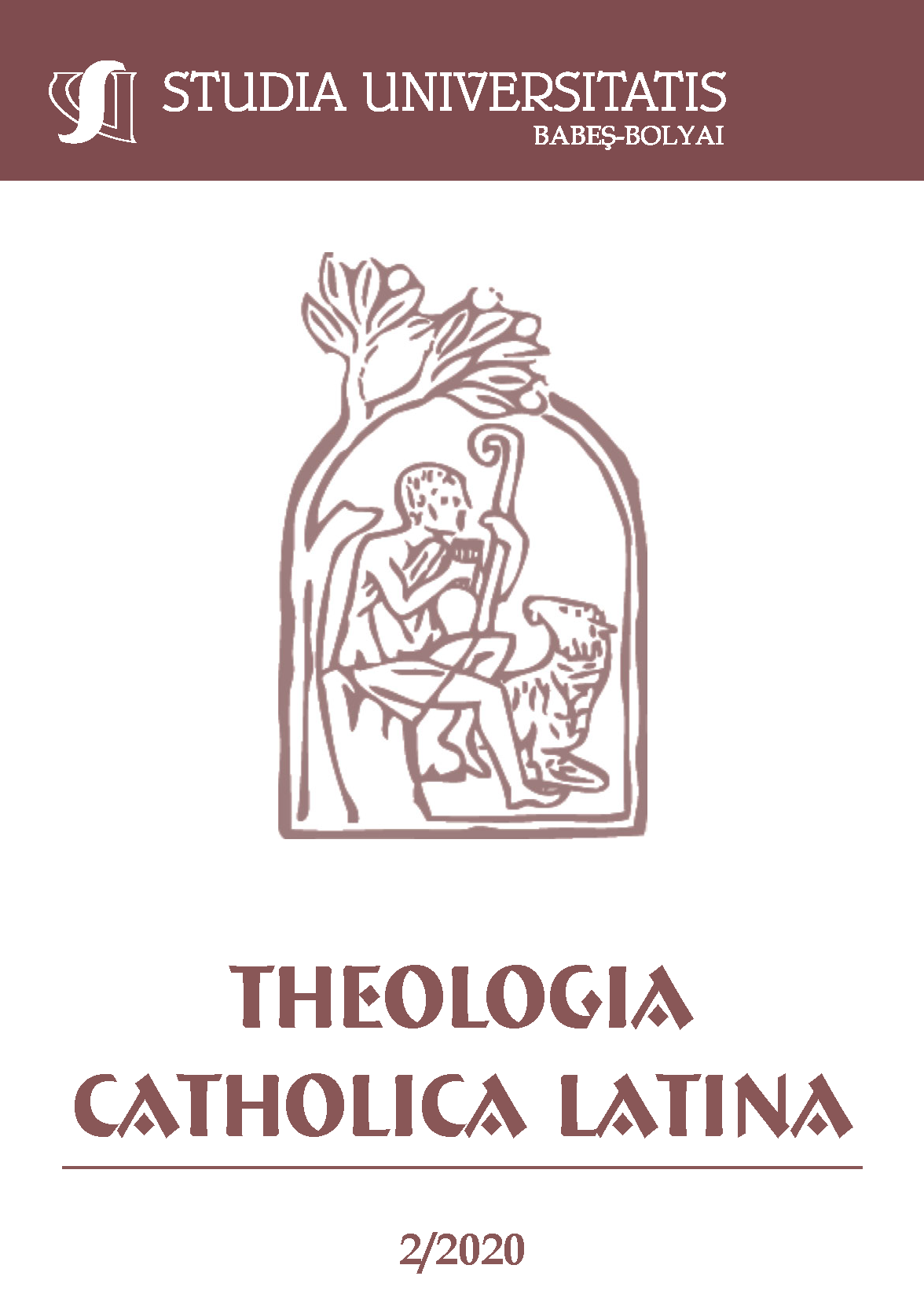IL “PRIVILEGIUM FORI” NEL CODICE DI TEODOSIO II
DOI:
https://doi.org/10.24193/theol.cath.latina.2020.LXV.2.03Keywords:
Codex Theodosianum, bishop, privilegium fori, Roman imperial constitutions, clerical exemption, universal canon law, jurisdiction.Abstract
‟Privilegium Fori” in the Codex Theodosianum. The article intends to present, briefly, one of the most important ecclesiastical privileges: privilegium fori, which is found in the Codex of Theodosius as a particular guarantee of the respect due to the sacred nature of clergy and freedom in the performance of their duties. According to this privilege, certain cases are removed from the jurisdiction of the State and devolved to the ecclesiastical judge, according to canonical discipline. It constitutes a form of personal immunity to civil law. By virtue of the privilegium fori, clergy must be tried only by ecclesiastical courts, to the exclusion of all others and without distinction of classes. This jurisdictional bond of clerigy to their own courts arises from a subjective delimitation of the judicial power of the Church and not from a privileged situation as it may be deduced from the expression with which it is known. If one understands that this is a privilege, then this is based on a mistaken premise, in other words, to attribute ordinary and universal character to State jurisdiction and special character to ecclesiastical jurisdiction, which leads to the qualification of the exemption from civil jurisdiction enjoyed by ecclesiastics as a personal privilege. The truth is very different, because the jurisdiction of the Church is its own, sovereign and autonomous, as derived from a Society that has the same characteristics. Moreover, jurisdiction being a correlative concept of the process, the independence of the canonical process carries with it that of ecclesiastical jurisdiction.
References
Codex Iuris Canonici Pii X Pontificis Maximi iussu digestus Benedicti Papae XV auctoritate promulgatus, in AAS 9, (1917-II).
Codex Iuris Canonici auctoritate Ioannis Pauli PP II promulgatus, in AAS 75 (1983-II) 1-318.
Codex Theodosianus, Krüger P. (ed.), Berolini 1923-1926.
Concilio Ecumenico Vaticano II: Costituzione dogmatica sulla Chiesa, Lumen gentium, (21.11.1964), AAS 57 (1965) 5-71.
Conciliorum oecumenicorum Decreta, Alberigo G. – Dossetti G. L. – Jannou P. – Leonardi C. – Prodi P. (a cura di), Bologna 1991.
Sacrorum Conciliorum: nova et amplissima Colectio, J. D. Mansi (ed.), tom. III, Florentiae 1759, col. 882.
Banfi, A., Habent illi iudices suos: studi sull’esclusività della giurisdizione ecclesiastica e sulle origini del privilegium fori in diritto romano e bizantino, Milano 2005.
Bardy, G., «San Giovanni Crisostomo», in Fliche A. - Martin V., (ed.), Storia della Chiesa, vol. IV, Torino 1977.
Bertola, A., «privilegium fori», Enciclopedia Cattolica, X, Firenze 1953, 44-45.
Bihlmeyer, K. – Tuechle, H., Storia della Chiesa, vol. I: L’antichità cristiana, Brescia 1960.
Bolognini, F., Lineamenti di Diritto canonico, Torino 1996.
Boy, J. F. C., «La episcopalis audientia de Constantino a Juliano el apostate», Studia et Documenta Historiae et Iuris 83 (2016), 120-134.
Boy, F. C. – Javier, F., La “episcopalis audientia”. La justicia Episcopal en las causas civiles, Valladolid 1985.
Bugnini, A., «defensor ecclesiae», Enciclopedia Cattolica, IV (1950), coll. 1301-1302.
Cayré, F., Patrologia e storia della Teologia, vol. I, Roma 1936.
Chiappetta, L., Il Codice di Diritto canonico. Commento giuridico pastorale, vol. I, Napoli 1988.
De Francisci, P., Sintesi storica del diritto romano, Roma 1968.
Del Giudice, V., Nozioni di diritto canonico, Milano 1970.
Doefler, M. E., «Social Justice in Early Christianity», in P. Barmash (ed.), The Oxford Handbook of Biblical Law, Oxford 2019, 525.
Ferraris, L., Prompta bibliotheca canonica…, vol. I, Romae 1885, voce, advocati ecclesiarum, 141-148.
Fliche, A. – Martin, V., (ed.), Storia della Chiesa, vol. III/1: Dalla pace costantiniana alla morte di Teodosio, Torino 1977.
Génestal, R., «Les origines du privilège clérical», Nouvelle revue historique de droit français et étranger, 32 (1908), 161-212.
Garcia y Garcia, A., Historia del derecho canonico, vol. I, Salamanca 1967.
Humfress, C., Thinking Through legal pluralism, in Duindam J. – Harries J. – Humfress C. – Hurvitz N. (edd.), Law and empire: ideas, practices, actors, Utrecht 2008.
Jedin, H., Storia della Chiesa, vol. II, Milano 1977.
Lefevre, Ch., «privilège», Dictionnaire de Droit Canonique, tom. VIII, Librairie Letouzey et Ané, 1962, coll. 225-226.
López, A. A. – González-Salinero, R., «Codex Theodosianus 16.2.12 and the Genesis of the Ecclesiastic Privilegium Fori», Journal for Late antique religion and culture, 13, (2019), 3-4.
Mommsen, Th. – Meyer, P. M., Theodosiani Libri XVI cum constitutionibus sirmondianis et Leges Novellae ad Theodosianum pertinentes, Weidmann 1991, vol. I/2.
Montan, A., Il diritto nella vita e nella missione della Chiesa, Bologna 2000.
Pal, M., «Episcopalis audientia nelle fonti del Diritto romano da Costantino a Teodosio II», Folia canonica 8 (2005), 207-220.
Pătrașcu, D. Gh., Patrologie și patristică, (sec. IV-V), vol. II, Roman 2008.
Pilara, G., «Sui tribunali ecclesiastici nel IV e V secolo. Ulteriori considerazioni», Studi Romani 3-4 (2004).
Pinto, V. P., Commento al Codice di Diritto canonico, Roma 1985.
Quasten, J., Patrologia, vol. II, Marietti 1969.
Savagnone, F. G., «Le origini del sinodo diocesano e la interpretatio alla c. 23 CTh. 16, 2», Studi in onore di B. Brugi, Palermo 1910, 565-600.
Stickler, A. M., Historia iuris canonici latini. I: Historia fontium, Pas-Verlag 1974.
Van Hove, A., Prolegomena ad Codicem Iuris Canonici, Mechliniae-Romae 1945.
Downloads
Published
How to Cite
Issue
Section
License
Copyright (c) 2020 Studia Universitatis Babeș-Bolyai Theologia Catholica Latina

This work is licensed under a Creative Commons Attribution-NonCommercial-NoDerivatives 4.0 International License.



